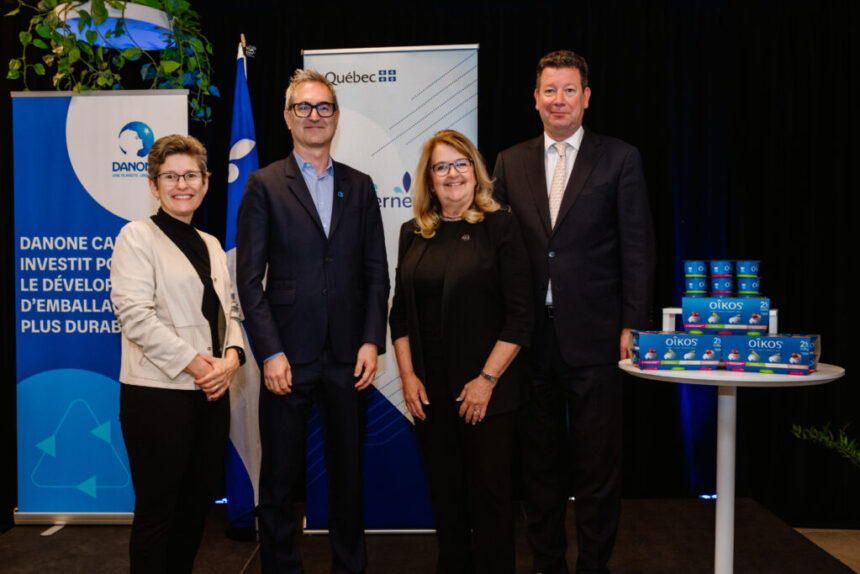As I stepped through the doors of Danone Canada’s Boucherville facility yesterday, the buzz of activity was palpable. The yogurt giant has just announced a substantial $7.5 million investment into this South Shore plant, marking a significant commitment to Quebec’s manufacturing sector.
“This investment represents our dedication to innovation and sustainability right here in Quebec,” explained Pauline Varga, President of Danone Canada, as we toured the facility. The funding will primarily upgrade the plant’s production capabilities and enhance its environmental sustainability measures.
The Boucherville facility, which has been operating since 1971, produces some of Canada’s most recognized dairy brands including Activia, Oikos, and Silk. With this new investment, Danone aims to increase production capacity while simultaneously reducing its environmental footprint.
Quebec’s Minister of Economy, Innovation and Energy, Pierre Fitzgibbon, was present at the announcement. “Food manufacturing remains a cornerstone of Quebec’s economy,” he noted during our conversation. “Investments like this one from Danone strengthen our position as a leader in sustainable food production.”
The economic impact extends beyond just the facility itself. According to Investissement Québec, the food manufacturing sector employs over 70,000 people across the province and generates approximately $8.9 billion in annual GDP.
For Boucherville Mayor Jean Martel, this announcement couldn’t come at a better time. “Having major employers like Danone reinvest in our community creates stability and opportunity,” he told me after the press conference. The plant currently employs nearly 300 workers from the region.
What caught my attention was Danone’s emphasis on sustainability. The company plans to upgrade refrigeration systems and waste management processes, aiming to reduce greenhouse gas emissions by 25% within three years.
As I walked through the production floor, Environmental Manager Sophie Tremblay pointed out where the new eco-friendly equipment would be installed. “We’re implementing water recycling systems that will save millions of liters annually,” she explained, her excitement evident despite the noise of machinery around us.
This investment aligns with Quebec’s 2030 Plan for a Green Economy, which aims to reduce greenhouse gas emissions while promoting sustainable economic growth. The food manufacturing sector has been identified as a key player in this transition.
Industry analysts from Montreal Economic Institute suggest this move reflects broader trends in Quebec’s manufacturing landscape. “Companies are increasingly looking to modernize operations with dual focus on productivity and sustainability,” explains economist Jean-François Perrault.
For local suppliers, the news brings optimism. “When major players like Danone invest locally, it creates ripple effects throughout the supply chain,” notes Catherine Bouchard, who runs a packaging business that works with several food manufacturers in the region.
The investment comes at a time when food security and local production have gained renewed importance. The pandemic highlighted vulnerabilities in global supply chains, pushing many companies to strengthen regional manufacturing capabilities.
Walking through Boucherville’s downtown after the announcement, I noticed the sense of pride among locals. At Café du Coin, owner Michel Lavoie shared his thoughts: “Having these big companies choose to stay and grow here means something. It gives us confidence in our economic future.”
Danone’s decision to invest in Boucherville also reflects Quebec’s competitive advantages in the food manufacturing sector. The province offers abundant natural resources, energy, and a skilled workforce, particularly in food science and processing technology.
The project is expected to begin immediately, with completion targeted for late 2024. Danone officials confirmed that production will continue uninterrupted during the upgrade process.
As Montreal continues to position itself as a hub for sustainable business practices, investments like this one serve as concrete examples of how traditional manufacturing can evolve to meet contemporary environmental challenges.
For the workers at the plant, this announcement brings reassurance. “It’s good to know the company sees a future here,” said Marie Beaulieu, who has worked at the facility for 17 years. “We’ve seen other plants close over the years, so this feels like a vote of confidence.”
As I drove back to Montreal, passing the St. Lawrence River that has witnessed centuries of economic evolution in Quebec, I couldn’t help but reflect on how investments like these shape our community’s future—one yogurt cup at a time.







